- Home
- Lorenzo Carcaterra
The Wolf: A Novel Page 18
The Wolf: A Novel Read online
Page 18
Then there was the issue of a potential mole at work either inside my own organization or in league with one of the other syndicates. Having a traitor in my circle is something I feared and did everything within my power to prevent. All mob bosses are concerned with betrayal and look at everyone—from within their inner circle to those on the periphery—as potential suspects. The reasons for an ally, business associate, or confidant to turn are as simple as they are numerous—profit is a reliable motive, as is the promise of more power. Sometimes it is done out of petty jealousy, other times to correct a perceived wrong. Find the Judas and the reason becomes clear.
I had considered everyone, and each would have sound reason to make the case to bring me down:
Angela’s father might have allowed her to work as my partner while he was free to lurk behind the scenes undetected and close a back-door deal.
Uncle Carlo might be less willing to put our crew through a costly war and more willing to line his pockets with Russian money.
Angela might have agreed to help in order to keep me under her gaze and, in Italy, within reach, prime for a setup.
Or it could be any one of the crime syndicate bosses at that initial meeting. All with good reason to have me put out of commission.
In other words, the knife in the back could come from anyone at any time.
“There’s something else Frantoni told me,” Angela said.
“What?”
“Police found something in Florence two days ago,” she said. “In a car, parked outside a Raza safe house near the Ponte Vecchio.”
“What?”
“Several picture postcards of the David,” Angela said. “On its own, nothing special. Still …”
“Raza practically lives in museums, they’re like a second home,” I said. “He walks the halls planning his terror attacks. I wouldn’t put it past him to bomb one of them.”
“Maybe,” Angela said. “Or maybe a postcard is just a postcard.”
I looked around the restaurant that had been crowded when we first came in but now was down to a few couples lingering over after-dinner drinks and dessert. We were both sitting with our backs against the soft leather of the booth, able to gaze out at the street. It was a few minutes after ten and this section of Naples, bustling, loud, and congested during the heat of the day, was silent and empty. I could see the steps leading to the courthouse and, on the other side, the narrow street that led to the old but still reliable train station.
It was then I spotted the car, a late model Mercedes four-door sedan, its windows tinted, white puffs rising from the dual tail pipes.
“Right now all we’re doing is guessing,” Angela said. “We need to get hard information and fast.”
“How far away are your two?” I asked, still looking out the window, wondering now if the parked car was a decoy and the hitters would come at us from another direction.
Angela was quick to catch my gaze. “If there’s trouble, fifteen seconds, no more,” she said.
“Is the back way out of here by the bathrooms?” I asked.
“Leads into an alley that takes you to the street across from the courthouse,” she said.
“I don’t plan on using it, “I said. “I needed to know, in case they come at us from behind.”
“Let’s not wait for them to come to us,” Angela said, easing out of the booth. She snapped open her shoulder bag and pulled out a black nine millimeter and looked at me. “I have a second one in case you’re light.”
I smiled, stepped out of the booth and pulled a Glock from a hip holster. I scanned the restaurant, making sure the remaining patrons were still at their tables and the wait staff at their stations. “Are three hundred euros enough to cover the meal?” I asked, reaching for my wallet.
“Leave your money where it is,” Angela said, her eyes locked onto the car outside, walking in slow, measured steps toward the front door. “My city, my treat.”
“When we go out, you head for your car,” I told her. “I’ll deal with the ones in the sedan. When they show, your guys can cover you and watch my back at the same time. If it gets too heated, you pull out of here.”
“That’s a good plan,” Angela said. “I’m not going to follow it, but it is a very good plan.”
I reached for her left arm and held her, looking at the warm eyes and tilted smile I had know since I was a boy. “Anything happens to you, your father is going to have me killed,” I said.
Angela laughed. “My father’s wanted to have you killed since you decided not to marry me.”
She looked up at me, leaned in and kissed me gently on the lips. Then we slowly parted, neither one saying a word as we headed for the front door.
We walked out of the restaurant in casual fashion, our guns down by our sides. Angela slid one hand under the crook of my right arm and slipped in closer to me. The street was empty, the overhead lights shielded by a humid mist. We stepped off the curb, Angela’s head resting now on my shoulder, her gun hand leaning against her lower back. We kept walking even as the four doors to the sedan swung open. Four men, each more physically imposing than the next, rushed out of the car as if they were responding to a fire, guns out and aimed in our direction. I gently eased in front of Angela, looking to shield her from the fuselage that was heading our way, lifting my Glock and firing two rounds in the direction of the four men, now less than twenty feet away. Bullets cascaded against the cobblestone street, sending small pieces of sand and mounds of dust into the air.
The shots fired from out of the darkness did not miss their mark.
Hidden deep in the shadows of the courthouse to our left, Brunello and Manzo hit their targets with pinpoint and deadly precision. They didn’t squander their ammo, keeping their aim steady, taking only the kill shot, bullets to the head and heart. Within seconds the four men lay on the ground, dead or dying, their guns out of reach.
It had happened in less than three minutes, four armed men barely getting off a half-dozen shots and each missing his targets. I looked down at the bodies under the shielded glow of the streetlights and knew they were not the ones sent there to kill us. They were the lambs sacrificed for the slaughter, dispatched to make me think the worst was over when it truth it had not yet even begun.
“Setup,” I shouted, loud enough for both Brunello and Manzo to hear.
“The alley next to the courthouse,” Angela said. “Or the door leading out of the restaurant kitchen. Those are the only two places they could come at us from.”
“Would anyone left in that restaurant bother to put a call to the cops?” I asked.
“Not here, no,” Angela said.
The street was as quiet as any I’ve ever been on. No one walked by, no car drove past. It was as if we were in an abandoned part of the city. I glanced over at Angela standing still as stone, listening for the slightest noise, her body poised to spring to action. Brunello and Manzo remained hidden under a blanket of darkness somewhere behind me.
Then came the footsteps, hard soles scraping against stone and sand and heading toward us from both the alley and the rear door of the restaurant. There could be as many as eight gunmen rushing our way, maybe even more. This was not Raza’s move; this had the smell of the Russian mob all over it. Leave it to Vladimir to sacrifice four men simply to dupe us into thinking we had lived through an attempt on our lives.
While I admired the audacity and brutality of the move, it was one I never would have made. I would never openly recruit someone to my organization to be nothing but a decoy. It was clear from their movements, the cut of their clothes, and their inability to hit two still targets within close range, that the four young men lying dead on the street beside me were amateurs who bought into the promise of a fast rise through the criminal ranks. They probably weren’t even paid for the job, and the sedan left idling nearby was a fresh lift from the streets of an upscale neighborhood.
“Take the car,” I said to Angela, pointing with my gun hand to the sedan nearby, the four do
ors still open. “The three of us will give you cover.”
“They’re my men and you’re my partner,” Angela said. “I don’t leave either one. But I’m charmed by your concern.”
“Wasn’t asking you to run,” I said. “Take the car and turn it toward the direction of the shooters. Throw your high beams on and fire into the alley. Keep the driver door open.”
Angela began to move toward the parked car. “Why?” she asked over her shoulder.
“Because you’re going to step out of the car right before it makes it into the alley,” I said.
“What about the ones coming out of the restaurant?”
“Your guys are positioned better to handle them,” I said. “Soon as they see the car move, they’ll know what to do.”
“Where will you be?”
“I’ll be on the passenger end of the car,” I said, “giving you as much cover as you’ll need.”
Moving faster, Angela jumped behind the wheel of the sedan and turned it toward the alley, kicking on the high beams as she swerved the car slowly toward the entrance. She had one leg out, high heel skimming the cobblestones, right hand on the wheel, left hand and gun resting on the open window, firing rounds into the alley in the direction of the approaching gunmen. Bullets from the gunmen hit the front end of the sedan and smashed one side of the windshield.
Over by the narrow street leading to the courthouse, I heard rapid gunfire coming from both ends, Brunello and Manzo now in a heated battle.
I was on the other side of the car, firing my Glock into the alley, the lights from the high beams giving the gunmen a poor line of vision. I counted seven through the smoke and saw that three were already down and one was about to fall.
The sedan was inches from the entrance to the alley when I saw Angela lurch from the driver’s side and stumble onto the pavement, gun still in her hand. I walked behind the car, jammed a fresh clip into the Glock and reached for her.
“I’m out of bullets,” she said as I helped her to her feet.
I held my left arm around her waist and fired at the shooters now trying to ease their way past the sedan blocking the alley, their figures visible in the heavy light. “Start moving toward your car,” I said to her. “But stay behind me.”
“How many more?”
“Two,” I said. “Maybe three, but one of them is wounded.”
“Brunello and Manzo,” Angela said. “I won’t leave without them.”
“We’re not going anywhere until every one of these shooters goes down.”
“You’re running low,” Angela said. “We’re going to need more guns.”
Angela left my side and started to run toward the bodies of the four gunmen who had initially approached us, their weapons strewn on the cobblestone street. As she left, I caught sight of one of the gunmen, bleeding from a gash on the side of his neck, squeeze past the sedan and aim his weapon toward her. There wasn’t enough time for me to warn her and I could see she was still several steps away from picking up one of the scattered guns. I ran toward her, firing at the gunman as I moved, the two of us spraying bullets into the humid night air.
I was right in front of Angela when I felt the sting in my left shoulder. An instant later the force of it brought me to my knees. Angela, now with a weapon in hand, stepped in front of me and fired three rounds at the gunman standing less than fifteen feet across from us. Two of the bullets found their mark, the fatal one making a small hole on the left side of the man’s cheek. He fell facedown onto the hard pavement.
Angela turned back to me, pushed aside a flap of my black leather jacket and tore open my blue shirt, drenched now in blood. “It’s deep,” she said of the wound, “but clear. You’ll lose blood, but you’ll be fine when we have a chance to patch you up.”
“It’s my favorite Armani, the shirt you just tore open,” I managed through gritted teeth. “I’ve had it for years.”
She laughed, then helped me to my feet. We both peered into the lit alley and saw nothing but crumpled bodies and heard nothing more than the groans of the wounded. All was quiet on the other end of the street, the narrow one by the courthouse. Then we heard the shuffling of feet against stones and saw Brunello and Manzo turn past the courthouse steps heading toward us. Manzo was dragging his left leg, blood flowing freely from a gunshot wound, his right arm draped around Brunello’s shoulders.
They both held semiautomatic weapons at the ready and smiled when they spotted us standing between the sedan and the four bodies. In the distance we could hear the sounds of police sirens heading our way. “Let’s go,” Angela said, turning toward her car, one arm gripped around my waist. “There’s a clinic nearby that will patch up you and Manzo. Once you’re both cleared to go, you’ll rest up at my place until you can get around on your own. “
As the four of us walked slowly toward Angela’s car, I gave a quick look back at the bodies we were leaving behind and wondered how many hundreds more would die before this war I declared would be brought to an end. “We were lucky tonight,” I said to Angela, ignoring the shooting pain in my shoulder.
“We need to stay that way,” she said.
Chapter 37
Florence, Italy
There was at least one dead terrorist in every room.
The thirteenth century Palazzo was once the home of a duke renowned for his collection of wines from around the world. Through the centuries, there had been royal galas, lavish dinner parties, and dozens of weddings attended by the city’s cultured and deep-pocketed.
On this day the stately rooms of the palazzo were witness to their first bloodbath.
The Silent Six had made their first major move on Raza’s network.
They attacked in the dead of the morning, the city still asleep, the rushing waters of the Arno the only noise. They moved through the house with efficiency, under the cover of smoke bombs. The palazzo was one of six safe houses being used by Raza’s cell. There were fourteen rooms spread across three floors, and sixteen terrorists living and working inside. The rooms had been stripped of most of their illustrious furnishings, replaced by foldout tables topped with computer monitors, printers, and cell phone tracking devices. There were also enough weapons stashed in the rooms to help set off several dozen terrorist attacks.
Each member of the Silent Six used their skills to take out the sleeping terrorists—Malasson utilized knives and ropes, leaving behind four dead; Kinder took out an equal number with close range kill hits to the head and heart; Pierce put his martial arts to the test, snapping necks with abandon; team leader Burke, a muzzled gun in each hand, shot and killed every target guarding the halls and entryway.
While the slaughter was under way, Weaver and Anderson worked as a team to position timers in corners of the house and set them to go off within fifteen minutes of their expected departure time.
The entire operation, from entry to the team meeting in the main hall, had taken less than twenty minutes.
“Strip the hard drives,” Burke said. “Go through the printed material and take anything that catches your eye.”
“What about the phones?” Anderson asked. “In this room and the others, I counted at least thirty.”
“Match them with our list of existing cells,” Burke said. “Take the ones not on the list.”
Pierce pulled six folded-up duffel bags from his pack and slapped them open on the marble floor. “Fill these with the weapons you find,” he said. “We leave nothing behind but bodies.”
“And do it fast,” Burke said. “Timers are set to go off in less than ten minutes, and it would suck for us to be here when that happened.”
Malasson sat on a foldout chair scrolling through a computer screen when she stopped and reached for a cell phone resting close to the monitor. She scrolled through the phone numbers listed under contacts until she settled on one. She stared at the number for a few seconds and then said, “Burke, I need you to come look at this.”
Burke stepped over a dead terrorist and handed an
armful of weapons to Kinder. He stood over Malasson’s shoulder and peered down at the cell phone.
“What am I looking at?” he asked.
“You tell me,” Malasson said.
Burke surveyed the list of phone numbers and stopped at the one he recognized, the one he had burned into his memory and called only four times since he was given access to it. “Take this with you,” he said, handing the cell phone back to Malasson. “When we get back, we need to find out all the calls that number generated and all the ones it received. Get the Greek to help you.”
“Do I tell him why?”
“You won’t need to tell him,” Burke said.
Burke turned from Malasson and shouted to the rest of the group, “Load up and let’s get out of here. We have less than four minutes to get to the truck.”
The Silent Six zipped the heavy duffel bags stuffed with weapons, ammo, scrawled notes, and ledger folders, tossed them across their shoulders and walked quietly and quickly out of a palazzo built to withstand the test of time but not the blast of a dozen high-end explosives.
They were in the van, Kinder behind the wheel switching gears, careening down a narrow side street, when the explosion lit up the night sky, shattering windows a mile in each direction, setting off car alarms and smoke detectors. The blast was so intense it forced the van to tilt to one side. Kinder held tight to the wheel and veered the car north, toward the highway that would lead them out of the center of Florence.
They left behind sixteen dead followers of Raza and a ruined palazzo. Sitting in the front seat across from Kinder, Burke was lost in thought, content with the success of the mission, conflicted over the troubling information found at the scene. He gazed at the scenery whizzing past and a morning sun that still lay hidden, not yet ready to greet a new day. He pulled a cell phone from the front flap of his flak jacket, held it for a moment and then pressed down on a number.

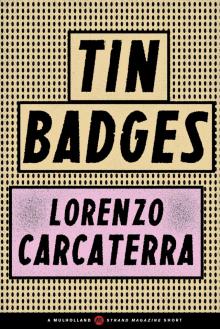 Tin Badges
Tin Badges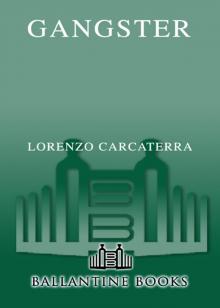 Gangster
Gangster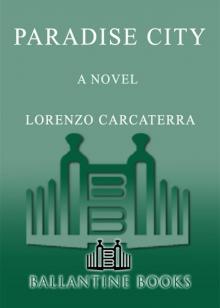 Paradise City
Paradise City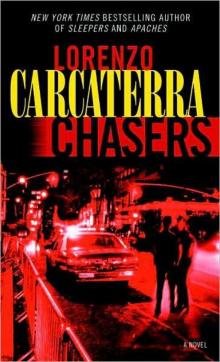 Chasers
Chasers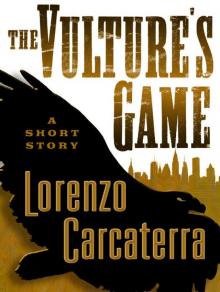 The Vulture's Game
The Vulture's Game Payback
Payback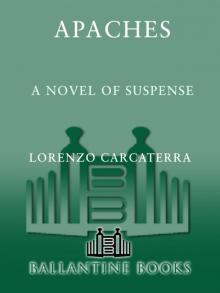 Apaches
Apaches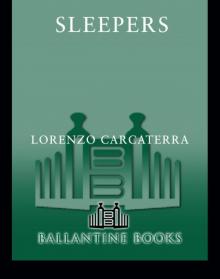 Sleepers
Sleepers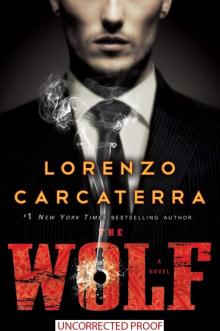 The Wolf
The Wolf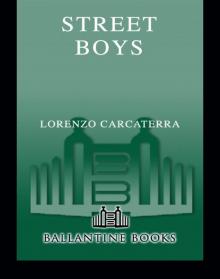 Street Boys
Street Boys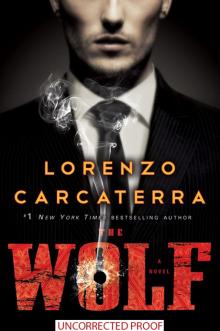 The Wolf: A Novel
The Wolf: A Novel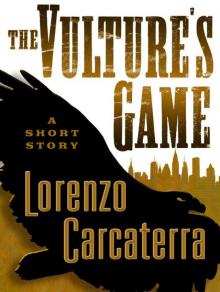 The Vulture's Game (Short Story)
The Vulture's Game (Short Story)